Funerary Inscription for Aphrodito
Translation:
To the Sacred Shades,
Aphrodito the mime lived forty years.
Eutychus writes this for his well-deserving spouse.
This funerary inscription for the mime actor Aphrodito by her husband Eutychus is dated from the first or second century AD, after the Roman conquest of Sicily during the First Punic War. Both names and the use of mimas, cognate with μιμάς, rather than the more common mima suggest Greek origins. Furthermore, the name Aphrodito pinpoints her origin to the northern Greece and Macedonia region. While not certain, the Greek names and the fact she was a mime actor suggests that Aphrodito was most likely a slave. Actors in general and mime actors in specific were not looked upon favorably by the Roman elite, and there are occasional stories of Roman citizens who performed losing their citizenship, though Roman attitudes did change over their thousand-year-long history, and we do not know as much about Roman theater as we might like. Most likely, Aphrodito was enslaved, perhaps her parents were poor and sold her into slavery, or she was kidnapped by pirates, or perhaps she had been captured in war. After being enslaved, she must have moved across the Mediterranean in a difficult sea voyage and then landed in Sicily, where she would have worked on a public stage, and been possibly subject to sexual assault and abuse. If she was lucky, she may have been able to free herself, or perhaps her husband Eutychus bought her freedom. Funerary monuments as today were not cheap and do indicate some modicum of wealth. Perhaps, Aphrodito was a very good mime actor and was able to earn enough money to earn her freedom, and forgetting her earlier history, her husband wrote the monument in Latin rather than her native Greek to indicate her prestige and prominence in the lived-in community, a symbol that Aphrodito had managed to beat her oppressors at their own game.

